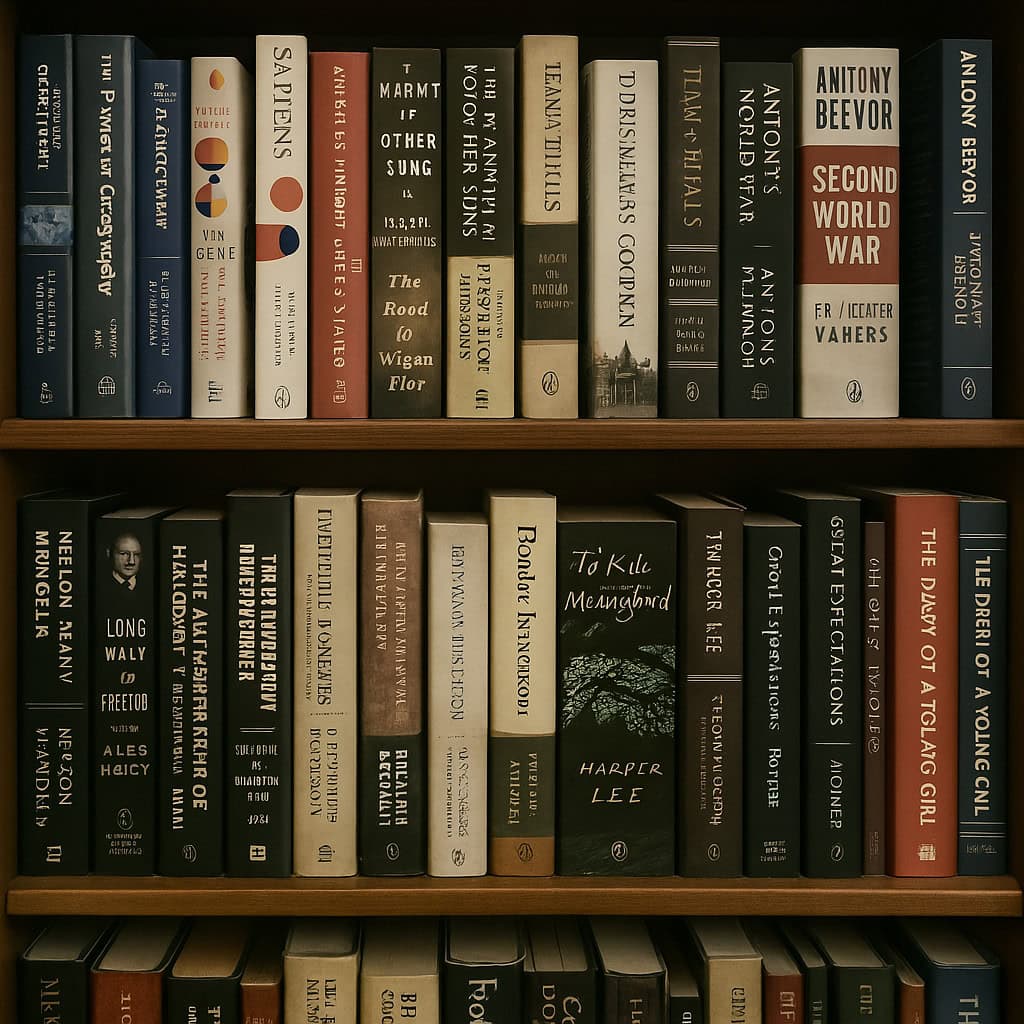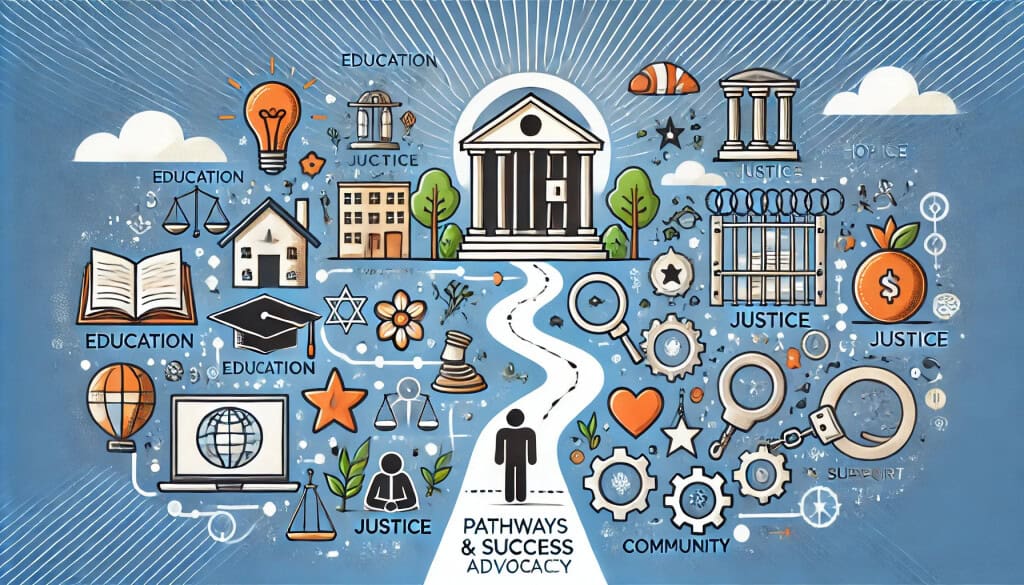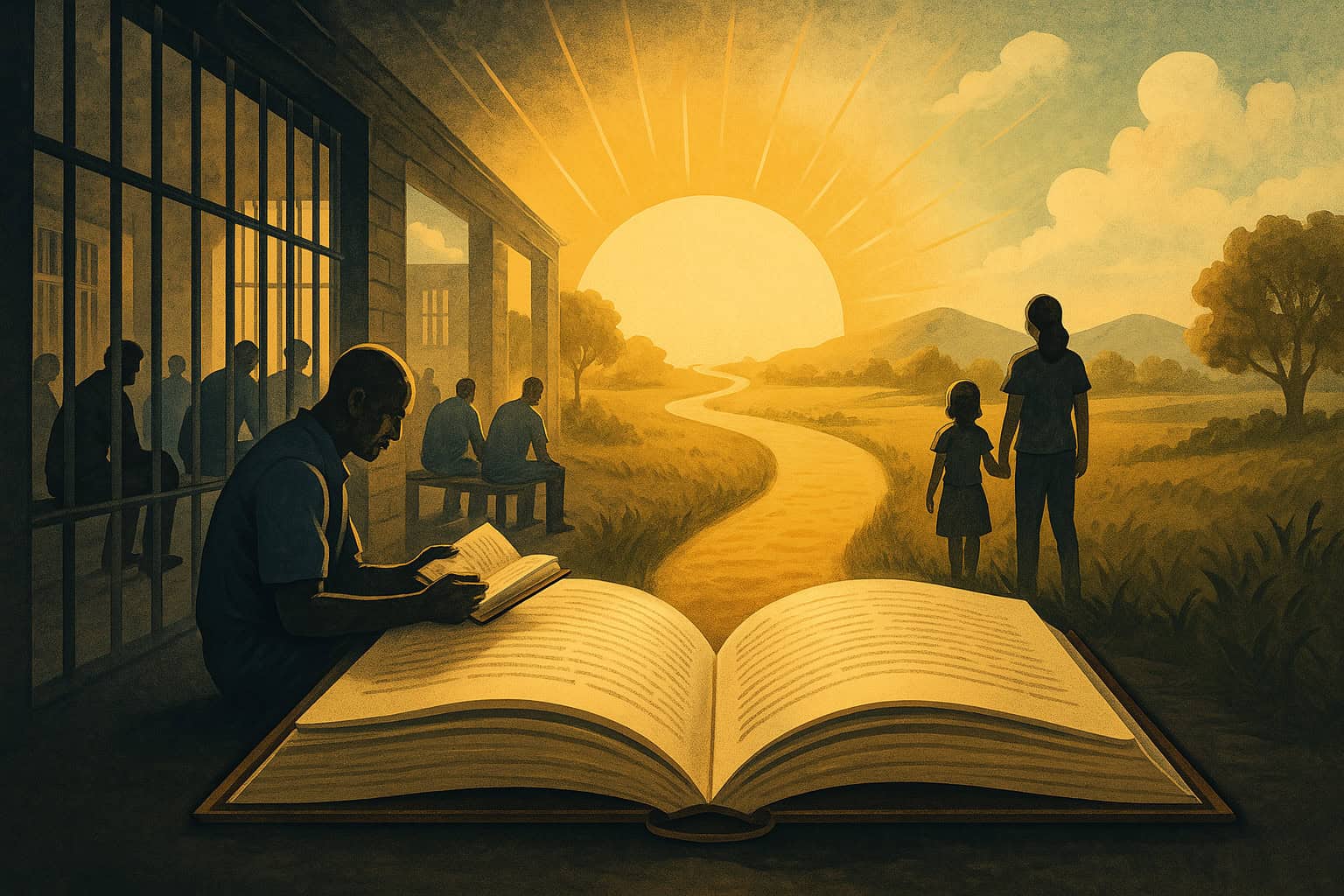Why Reading Matters for Prisoners and Their Families
Time spent in prison can feel stagnant and isolating, but it doesn’t have to be wasted. One powerful way to make the most out of incarceration is by using books to stretch the mind, expand perspectives, and build skills that can pave the way for future success. Reading offers prisoners a chance to break free mentally from the confines of their physical environment, exploring new worlds, historical eras, groundbreaking ideas, and the lives of extraordinary individuals. It also provides a meaningful way for prisoners and their family members to connect, offering a shared experience that strengthens family bonds despite physical separation.
Reading strategically chosen books not only fills the hours productively but also opens doors to new ideas and possibilities, sparking motivation and resilience. When families participate by reading the same books, they create a dialogue of growth and learning that helps incarcerated loved ones feel supported and less alone in their journey toward self-improvement.
How Books Can Change Lives
Books aren’t just an escape—they’re a form of education, inspiration, and transformation. Here’s why prisoners and their families should prioritize reading:
• Mental Expansion: Reading encourages critical thinking, analytical skills, and intellectual curiosity, essential traits for success both behind bars and upon release.
• Empathy and Understanding: Books allow readers to experience life from different perspectives, fostering empathy and emotional intelligence.
• Historical Insight: Exploring history through books helps prisoners understand broader societal contexts, offering lessons from past triumphs and mistakes.
• Family Connection: Sharing a reading experience provides common ground for meaningful conversations, enhancing emotional bonds.
Sharing the Experience: Strengthening Family Bonds Through Reading
To maximize the impact of these books, families and their incarcerated loved ones can:
• Write Letters: Share your thoughts and reflections about specific chapters or passages. Letter-writing allows deep and thoughtful exchanges that strengthen connections.
• Discuss by Phone: Use phone calls to talk about key insights or questions arising from the book. This can provide emotional support and intellectual stimulation.
• Create a Book Club: Even informally, choosing a book to read together creates accountability and shared goals, bringing excitement to the experience of reading.
• Exchange Notes: Take notes or highlight meaningful quotes while reading, then share these notes via mail. Comparing your impressions and interpretations can deepen understanding and connection.
Making Reading a Habit
Encourage consistency by setting achievable reading goals, such as reading one chapter per day or a book per month. Celebrate progress together, reinforcing the value and joy found in reading.
Final Thoughts: Unlock Your Potential Through Reading
Prison time doesn’t have to be lost time. Through deliberate and thoughtful reading, prisoners can equip themselves mentally and emotionally for future success. Families who join in the journey can offer crucial support while also gaining personal growth and deeper bonds. Together, books can become a powerful catalyst for change, empowerment, and lasting success.
Recommended Books to Stretch Your Mind and Inspire Success

Consider starting your reading journey with these transformative selections (see descriptions of many of these books below):
History & Social Science
• Sapiens: A Brief History of Humankind by Yuval Noah Harari – A sweeping journey through human history that connects anthropology, biology, and sociology. Harari’s engaging narrative spans from the cognitive revolution to modern global societies, helping readers see the broader arc of humanity beyond their immediate circumstances. This book challenges readers to reconsider what unites people – from shared myths to scientific advances – and leaves one feeling more informed about our world’s interconnected story.
• Guns, Germs, and Steel by Jared Diamond – An enlightening global history examining why some civilizations prospered over others. Diamond rejects racial or genetic explanations for world inequality, instead highlighting geography, agriculture, and environment as the drivers of power differences across continents. By exploring 13,000 years of human development, this Pulitzer Prize-winning book broadens perspective on how fate and chance – not inherent superiority – shaped the modern world. It’s an eye-opening look at history that encourages critical thinking about culture and destiny.
• A People’s History of the United States by Howard Zinn – An unorthodox history of America told from the viewpoint of the common people rather than presidents and generals. Zinn shines light on the struggles of Indigenous peoples, slaves, laborers, and others often left out of textbooks. This book can provoke reflection on social justice by showing how ordinary citizens fought against exploitation and oppression. For an incarcerated reader, it’s a reminder that understanding history’s “bottom up” perspective can empower one to think critically about authority and one’s own place in society.
Science & Discovery
• A Brief History of Time by Stephen Hawking – World-renowned physicist Stephen Hawking guides readers through cosmology in plain language. Covering fundamental concepts like space, time, black holes, and the Big Bang, Hawking wrote this book specifically for non-scientists. It opens up the wonders of the universe, explaining how we evolved from the big bang and where the cosmos might be headed. For someone in confinement, this landmark book (which has sold over 25 million copies) can ignite a sense of curiosity about our universe and an appreciation of science as a way to transcend one’s immediate reality.
• Cosmos by Carl Sagan – A classic work based on Sagan’s famous TV series, Cosmosexplores the origins of the universe, the evolution of life, and humanity’s quest for knowledge. Sagan covers a vast range of topics – from the birth of galaxies and the DNA of cells to the history of scientific discovery – all conveyed in an accessible, awe-inspiring style. His passion for education and wonder shines through every chapter. Reading Cosmos can instill a profound sense of connection to the universe and underscore the power of human curiosity to break mental barriers.
• A Short History of Nearly Everything by Bill Bryson – As the title suggests, this book joyfully tackles a bit of almost every scientific field – physics, chemistry, geology, biology, and more. Bryson, known for travel writing, turns his attention to science and explains complex topics in everyday language with humor and clarity. He takes the reader from the Big Bang to the rise of humanity, emphasizing how remarkable it is that we exist at all. This engaging overview of scientific knowledge not only teaches fascinating facts but also conveys the excitement of learning – a great inspiration for someone looking to use their time to understand how the world works.
Philosophy & Insight
• Meditations by Marcus Aurelius – The personal reflections of a Roman emperor who was also a Stoic philosopher, Meditations is essentially a handbook on how to live with wisdom and integrity. Marcus Aurelius wrote these private notes almost 2,000 years ago as guidance for himself, never expecting they’d be read by others. The result is a deeply honest and practical exploration of virtue, self-discipline, resilience, and the fleeting nature of life. In a prison setting, this classic can serve as a calming companion – teaching that while we can’t control what happens to us, we can control our responses and maintain our dignity and principles amid hardship.
• Man’s Search for Meaning by Viktor Frankl – A profoundly moving memoir and philosophical treatise by a Holocaust survivor and psychiatrist. Frankl recounts his experiences in Nazi concentration camps and observes that those who found meaning or purpose even in suffering were more likely to survive. He introduces “logotherapy,” the idea that our primary drive is not pleasure but the pursuit of meaning in life. For incarcerated readers, Frankl’s message – that we can choose our attitude in any circumstance and find purpose in pain – can be transformative. This book has been named one of the most influential of the 20th century for its insight that even in the worst situations, one’s inner freedom to choose meaning cannot be taken away.
• Sophie’s World by Jostein Gaarder – An ingenious novel that doubles as a beginner’s guide to Western philosophy. It follows a 14-year-old girl, Sophie, who mysteriously begins receiving lessons from a philosopher – launching her (and the reader) on a tour through the history of philosophical thought. As Sophie encounters ideas from Socrates, Descartes, Spinoza, Nietzsche and more, complex concepts are broken down in an understandable, story-driven way. This book is valuable for prisoners because it shows that anyone, even without formal education, can engage with big questions like “Who am I?” and “What is the meaning of life?” It’s a fun, mind-expanding introduction to philosophy that encourages curiosity about ideas and self-reflection.
• Zen and the Art of Motorcycle Maintenance by Robert M. Pirsig – A modern classic that is part road-trip story, part philosophical exploration. As a father and son ride a motorcycle across America, Pirsig delves into a quest for the definition of “Quality” and how to live a meaningful life. The narrative becomes a personal and philosophical odyssey into fundamental questions of how to live. It contrasts technological rationality with human values, East with West, and asks how we can reconcile logical thinking with life’s spiritual side. This book challenges comfort zones by prompting deep introspection, making readers consider their own values, frustrations, and search for peace of mind. For someone in prison, it’s an invitation to embark on an inward journey and perhaps discover a new perspective on what “quality” means in one’s life.
Biography & Memoir
• Long Walk to Freedom by Nelson Mandela – The autobiography of South Africa’s first Black president, detailing his youth, activism against apartheid, 27 years of imprisonment, and eventual triumph as a leader. Mandela’s story shows how dedication to education and principle can sustain a person through unimaginable hardship. Even on Robben Island, he encouraged fellow prisoners to study and make their time count. His journey from prisoner to president is the ultimate testament to resilience, hope, and the belief that “the struggle” for justice continues. This memoir can inspire incarcerated readers to use their time for personal growth and to hold on to hope and integrity despite adversity.
• The Autobiography of Malcolm X by Malcolm X (as told to Alex Haley) – A gripping life story of transformation and self-education. Malcolm X recounts his journey from a troubled youth involved in crime to his rebirth in prison through reading and faith. Famously, he describes copying out the dictionary to teach himself vocabulary and devouring books on history, religion, and politics while behind bars. This intellectual awakening gave him a newfound sense of purpose and freedom even before he was released. His autobiography not only provides a sharp critique of racism in America, but also serves as a powerful example of how knowledge can radically change one’s worldview. It encourages prisoners to read with purpose – Malcolm literally shows that books can be a path from confinement to enlightenment.
• Narrative of the Life of Frederick Douglass by Frederick Douglass – The 1845 autobiography of an American who escaped slavery, this is a foundational story about the liberating power of literacy. Douglass shares how he learned to read and write in secret, despite it being forbidden, and how knowledge opened his mind to the injustice of bondage. His famous quote, “Once you learn to read, you will be forever free,” resonates strongly in a prison context. Douglass’s life demonstrates that education is a form of resistance against oppression. His journey from an illiterate enslaved person to a leading abolitionist and advisor to presidents is an inspiring reminder that intellectual freedom can precede and pave the way for physical freedom.
• Educated by Tara Westover – A recent memoir (2018) about growing up in a strict, abusive survivalist family in rural Idaho and finding liberation through education. Tara Westover had no formal schooling until age 17; her upbringing was dominated by her father’s radical distrust of institutions. Educated recounts how she taught herself enough math and grammar to take the ACT, gained admission to college, and eventually earned a PhD at Cambridge University. Along the way, she struggles to reconcile loyalty to her family with her thirst for knowledge. Westover’s story emphasizes the importance of education in enlarging one’s world – a theme very relevant in prison. It shows that learning can break mental shackles and enable a person to redefine themselves. This memoir can inspire readers to pursue knowledge as a route to personal transformation, no matter how unconventional or difficult the path.
Classic & Historical Fiction
• The Count of Monte Cristo by Alexandre Dumas – A grand adventure novel set in 19th-century France, brimming with themes of injustice, hope, and vengeance. Edmond Dantès, a young sailor, is wrongly imprisoned for years but educates himself and finds a treasure that enables him to exact justice on those who betrayed him. The novel emphasizes patience and hope in the face of adversity – Dantès survives his dungeon by keeping his mind sharp and clinging to the idea of future redemption. Beyond the thrilling escape and revenge plot, The Count of Monte Cristo offers insight into historical French society and raises moral questions about revenge vs. mercy. For incarcerated readers, Edmond Dantès’ ultimate journey toward forgiveness and peace can be both gripping and enlightening.
• To Kill a Mockingbird by Harper Lee – A timeless American classic that explores racial injustice and moral growth in the 1930s Deep South. Told through the eyes of young Scout Finch, the story centers on her father, Atticus Finch, who defends a Black man falsely accused of a crime. This novel is renowned for its profound exploration of prejudice, empathy, and integrity. It shows a community divided by racism and the courage it takes to stand up for what’s right. Reading To Kill a Mockingbird encourages one to consider the importance of compassion – “climbing into another’s skin and walking around in it” – and challenges any sense of moral complacency. In a prison context, its lessons about understanding others and holding onto one’s moral compass are especially valuable.
• 1984 by George Orwell – A dystopian fiction that remains urgently relevant about the dangers of totalitarianism. Orwell depicts a future where government surveillance is constant, history is manipulated, and independent thought is crushed – a world where “Big Brother” monitors everyone. Through the story of Winston Smith, 1984 serves as a chilling warning about the fragility of freedom and the manipulation of truth. For readers in confinement, the novel can have a special resonance: it underscores why the freedom to think and speak truth matters so much. It’s an intense, thought-provoking read that will push one to cherish intellectual freedom and be vigilant about any system (even a prison system) that tries to strip away one’s sense of self or reality.
• Things Fall Apart by Chinua Achebe – A seminal African novel that provides a window into a Nigerian village undergoing the upheaval of colonialism in the late 19th century. The story follows Okonkwo, a proud Igbo man, and how his traditional community is disrupted by the arrival of British missionaries and colonial government. Achebe offers a poignant, insightful look at a clash of cultures and the consequences of Westernization . This book will broaden any reader’s cultural perspective – depicting pre-colonial African society with nuance, and then showing that society’s fracture and resilience under foreign influence. Incarcerated readers may draw parallels between the loss of control experienced by the novel’s characters and their own lives, and find lessons in how individuals cope with unstoppable change. Things Fall Apartchallenges one to think about identity, pride, and change in a global historical context.
• Crime and Punishment by Fyodor Dostoevsky – A profound psychological novel that plumbs the depths of guilt and morality. It tells the story of Raskolnikov, an impoverished ex-student in 1860s Russia who convinces himself he’s entitled to commit a murder in pursuit of a theory – and the mental torment that follows. Dostoevsky’s work is a timeless exploration of conscience, redemption, and what it means to pay for one’s crimes. Reading this classic can be a revelatory experience for someone in prison: it forces the reader to confront uncomfortable ethical questions and witness the protagonist’s eventual remorse and search for redemption. Crime and Punishment shows that punishment is not merely an external sentence but also an internal reckoning. It’s a challenging read that rewards with deep insights into justice, responsibility, and the human spirit’s capacity for change.
Biographies & Memoirs:
• Long Walk to Freedom by Nelson Mandela
• Educated by Tara Westover
History & Historical Fiction:
• Team of Rivals: The Political Genius of Abraham Lincoln by Doris Kearns Goodwin
• The Book Thief by Markus Zusak (Historical Fiction)
• 1776 by David McCullough
Science & Innovation:
• The Immortal Life of Henrietta Lacks by Rebecca Skloot
Philosophy & Critical Thinking:
• Thinking, Fast and Slow by Daniel Kahneman
Self-Improvement & Success:
• Atomic Habits by James Clear
• How to Win Friends and Influence People by Dale Carnegie
• The 7 Habits of Highly Effective People by Stephen R. Covey
About Pathways to Success and Georgia Prisoners Speak (GPS)

At Georgia Prisoners Speak (GPS), we believe that education is one of the most powerful tools for breaking cycles of incarceration and building a better future. That’s why we created the Pathways to Success program—a dedicated initiative providing educational resources, skill-building guides, and financial literacy tools tailored specifically for prisoners and their families.
GPS is a prison reform advocacy platform focused on exposing systemic injustices, pushing for policy change, and empowering incarcerated individuals with the knowledge they need to successfully re-enter society. Our educational articles are part of this mission, ensuring that those impacted by incarceration have access to practical guidance that can help them build stability, opportunity, and financial independence.
To explore more resources, visit Pathways to Success.


1 thought on “Pathways to Success: Reading Your Way to Freedom”